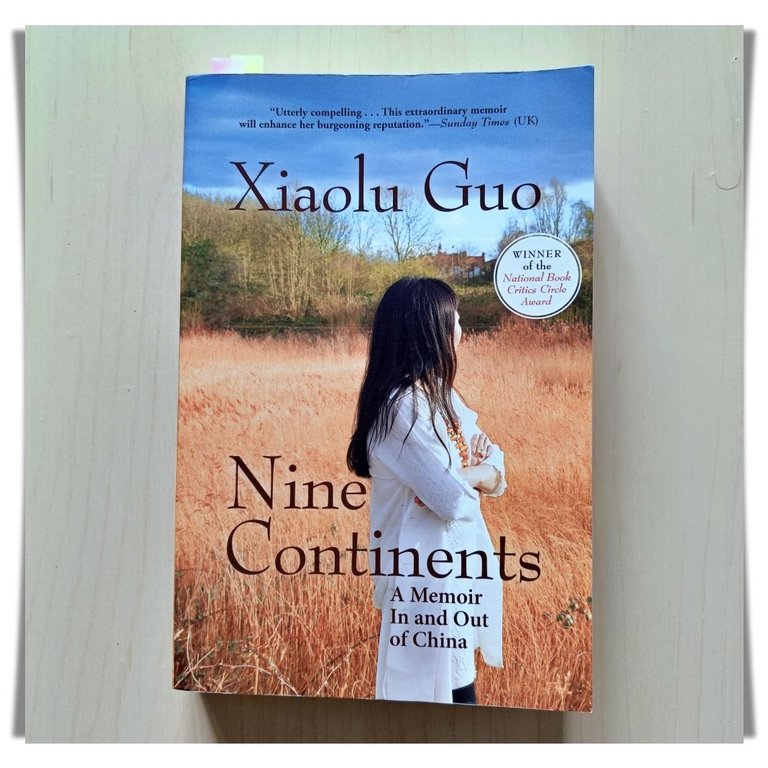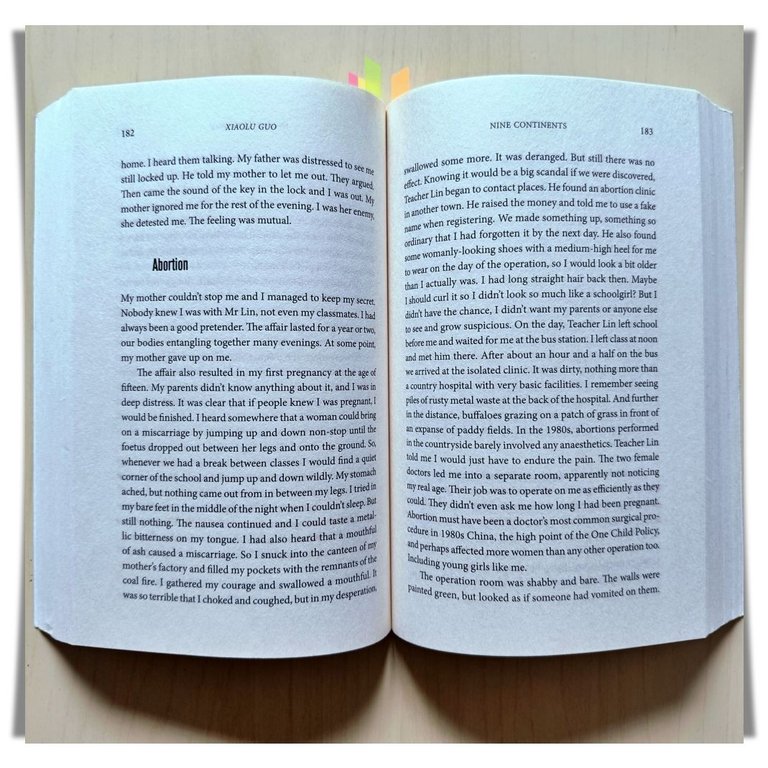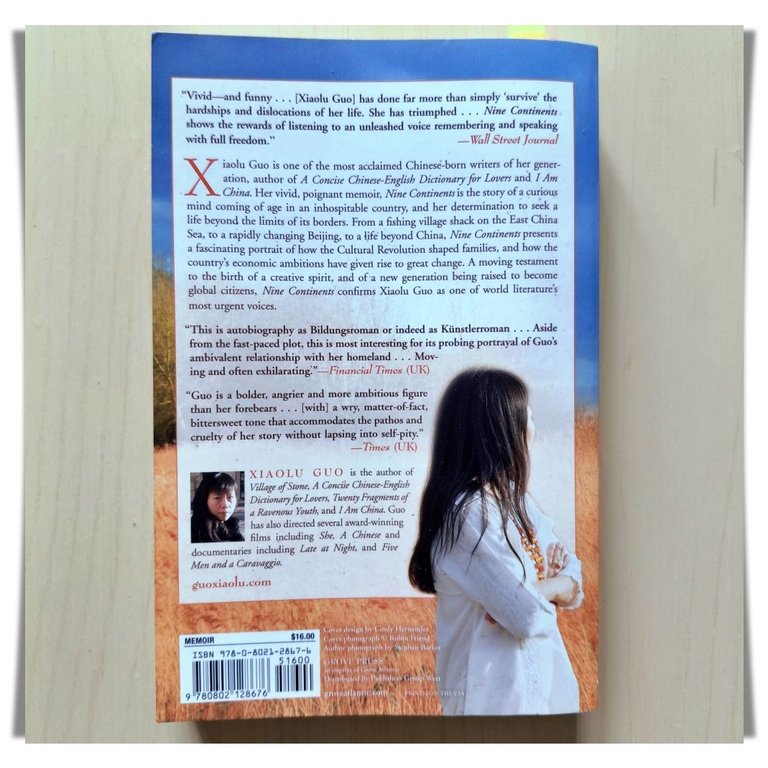Xiaolu Guo’s Nine Continents: A Memoir In and Out of China is a book that stays with you long after you’ve closed the final page. It is not only a story of one woman’s life but also an examination of identity, resilience, and the indelible connection between place and self. I read her words with a feeling of closeness to her struggles and her achievements, as if she were addressing me directly in a part of my being that was still connected to my homeland, Sarawak, Borneo, where my own cultural roots reside.

Guo takes us on a journey from the struggle of her tumultuous childhood in a rural fishing village to the estrangement from her parents, her budding artistic career, and her eventual departure from China. What resonated most with me was how she walks the line between belonging and freedom. For Guo, escaping China was escaping a dogmatic and oppressive system, but it also meant leaving behind the landscape and language that had shaped her.
As I pondered her story, I thought of my own essay, An Iban’s Reflection: Inheriting Courage from My Warrior Ancestors. Guo’s story reminded me of courage, not the kind found on the battlefield, but the small acts of bravery to face the past and carve a different road. Like Guo, I struggle with what it means to honor the traditions of my ancestors while creating an identity of my own that has a place and a role in the modern world. Her memoir also reminded me that courage lives in remembering, in honoring, and keeping alive the stories and spirits of those who came before us.
Guo's writing style is refreshingly honest, revealing the raw reality of her early life. Her account of poverty is heart-wrenching, but she doesn’t let it define her. Instead, she threads it through a lens that interrogates the broader socio-political structures of China. This resonated deeply with me, particularly as I consider the evolution of my own community. In my essay, I wrote about the transition from a warrior culture to one striving for modernity. When Guo addressed China’s rapid modernization, it rang with the struggles I had written about in my essay. Even though we are standing in different contexts, it is a thread that binds us—the tension between preserving heritage while adapting to change.

Another aspect of Guo’s bravery is her willingness to face and write so candidly about deeply painful and personal things, such as her trauma of sexual abuse. It is truly courageous that she exposes these aspects of her life. Likewise, her complicated relationship with her mother—defined by a complete lack of emotional attunement—is rendered with heart-rending forthrightness. The chapter in which she describes her mother’s abuse of her grandmother is especially heartbreaking. It’s a cycle of violence and dysfunction that shaped Guo’s view of her family and drove that resentment of her mother deeper.
Perhaps the most memorable and brave move in the book comes when Guo resolves to write her novels in English, despite her limited grasp of the language. She had a challenging time adjusting to the transition because Mandarin—a language of symbols—is very different from English. This choice demonstrates her determination and desire to connect with a global readership. As someone who writes in English despite it not being my first language, I empathized with her struggle. There’s always this balancing act—striving to be true to your voice but also making it accessible to others. Guo’s courage reminded me that it’s okay to feel vulnerable in that space. Vulnerability, after all, is where connection happens.
Another crucial moment is her decision to renounce her Chinese citizenship for a British passport. It was a heartbreaking act of severance, symbolizing not just the loss of nationality but also a further estrangement from her homeland. Her estrangement from her brother made this disconnect even starker when her mother died, leaving her without direct family ties to China.
What’s particularly compelling about Guo’s memoir is how well she weaves personal anecdotes with broader philosophical questions. She examines the intersection of art and survival, asking what it means to be an artist in a world that often prioritizes practicality over creativity. Her reflections were like a reflection of my own struggles with writing and art. Is storytelling a form of resistance? Guo’s experience points to the answer being yes—that art can heal, connect, and transform.

Reading Nine Continents also made me think about displacement—a theme that runs throughout her memoir and my thoughts about my Iban heritage. As someone living away from Sarawak, I often think about how much identity is tied to place and how much can be carried within me. Guo’s memoir was a reassuring reminder: we may leave home at some point, but our homeland never truly leaves us. It survives in our memories, in our language, and in our art.
In the end, Nine Continents is a memoir of transformation. It's about discovering your voice amidst the chaos and mastering the burden of the past without succumbing to it. For anyone who’s ever felt suspended between worlds—between tradition and modernity, between home and elsewhere—Guo’s memoir serves as a source of hope. It reminds us that it can be done: that we can acknowledge our roots while also striving for the stars.
Closing the book, I found a revived sense of purpose. Guo’s bravery in telling her own story made me want to keep telling mine. Because whether through essays, poetry, or art, I am reminded that our stories matter—not just for ourselves, but for those who come after us.
Note: More posts about my culture, Iban of Sarawak, Borneo (Malaysia):
- An Iban's Reflection | Inheriting Courage From My Warrior Ancestors
- Marriage Traditions of the Iban of Sarawak, Borneo
- Tracing My Roots | Poetry, Heritage, and Hope
- A Warrior's Reckoning | The Last Dawn of An Iban War Leader
- Gawai Antu | A Personal Journey Through Memory and Meaning
- A Mosaic of Self | Exploring Heritage, Identity and Belonging
- Exploring My Culture | The Headhunting Practice of the Dayak Iban of Borneo
- Dayak Iban's Mythical Figure | Sengalang Burong the God of War, and Tracing My Ancestry To Him
That's it for now. If you read this far, thank you. I appreciate it so much! Kindly give me a follow if you like my content. I mostly write about making art, writing, life musings, and our mundane yet charming family life here in Klang Valley, Malaysia.
Note: All images used belong to me unless stated otherwise.

This your review of this book makes me want to read it. It seems so full of inspiration and positivity. It's been so long since I read a memoir. Maybe your review of nine continents is a call for me to get back to them.
Thank you. I'm glad it inspires you to pick up a memoir. The first part of the book that talks about sexual abuse of a minor can be triggering for some people. But it's a wonderful book, and Xiaolu Guo is a fighter and a brave woman.